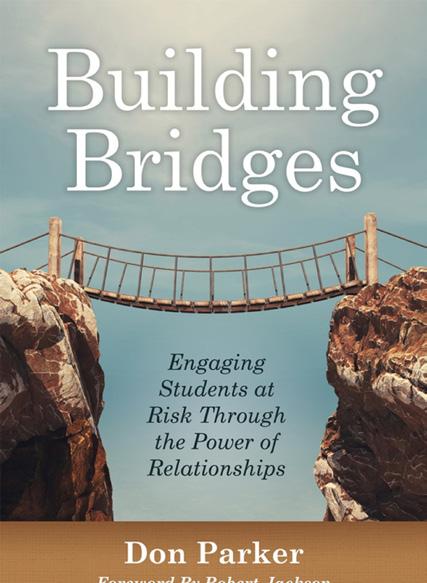
5 minute read
Be Relentless in Building Bridges
By Dr. Don Parker, Author of Building Bridges: Engaging Students Through the Power of Relationships
Have you ever found it difficult to connect with a student?
Have you ever wanted to “throw in the towel” when times get rough?
In the first chapter of my book, Building Bridges: Engaging Students Through the Power of Relationships, I describe how to adopt a relationship-building mindset. Educators that have a relationship-building mindset make a commitment to persevere, be relentless in showing their students that they care about them, and go above-and-beyond to build trusting relationships with them. The greater the number of teachers committing to this style of growth-fostering education, the greater are students’ chances for success.
When examining the causes for unruly student behavior that hinders academic success, several factors deserve scrutiny. A majority of the research on school discipline suggests that poverty, lack of social skills, lack of parental involvement, disintegration of family structure, television and media, and students’ home environments contribute to disruptive behavior (Atkins et al., 2002; Bear, 1998; Skiba & Peterson, 2003). These are powerful—and sometimes impossible—factors for educators to overcome.
Because these factors are beyond educators’ control, it is easy to point to them whenever disruption festers in classroom settings and when a negative school climate persists after failed attempts to repair it. I have been guilty of this myself. When I was a dean of students working in a Chicago suburban high school, I took it personally when students misbehaved or when the negative school climate did not improve. I viewed my successes and failures on the job as reflections of who I was as a person. On days when student behavior was good in the building and there were no fights, I felt proud. On days when I had to process numerous discipline referrals for disrespect and insubordination or constantly break up fights, I carried a negative attitude around with me. Unfortunately, for quite some time, I had far more bad days than good.
To be more effective at helping students at risk behave appropriately, I wanted to learn the best methods for doing so and become skilled in their use. As part of earning my doctorate in educational leadership, I studied research, conducted a study of my own, and wrote a dissertation on the most effective methods to use with students at risk to decrease behavior referrals. My experience and educational research has revealed that the most effective methods involve authoritative counseling and building relationships with students (Baker, Grant, & Morlock, 2008; Wang & Maureen, 2013).
During my workshop “Building Trusting Relationships with At-Risk Students,” attendees share how they struggle to build relationships with some of their more challenging students, sometimes falling into the trap of indifference. They describe the backgrounds of the students and some of their behaviors. They share stories of enduring disrespect, insubordination, and contempt and how they are cursed at, ignored, and even threatened.
Some state that they do not receive any help from their students’ parents and lament the many factors giving rise to poor behavior and low academic performance. At times, some even state they lack interest in building relationships with some of their students. Many teachers tell me that they feel themselves going into survival mode within the first quarter of the school year, followed by a period of selfreflection to decide whether they want to continue to teach.
I tell them, “I’ve been there and done that! Now let’s do something about it.”
Educators and teachers are some of the most resilient people you will meet, possessing qualities of strength and determination. Does this describe you? Here are some ideas to keep in mind:
■ Know this: even when the task is difficult—perhaps especially when the task is difficult—the potential for amazing outcomes is worth it.
■ Maintain optimism and frame the challenge as an opportunity for life-changing success.
■ No matter how adamantly these students attempt to push teachers away, they will so greatly appreciate knowing that their teachers care for them that they may develop an unwavering loyalty in return.
Now picture the students you have difficulty with, and use this same mindset of determination to forge positive and trusting relationships with them. Parallel the goal of establishing a relationship with them to the goal you have already brought to fruition through your hard work and willpower. Tell yourself that since you were capable of investing the necessary amount of time, energy, physical effort, and mental effort into that goal, you are also capable of investing what is necessary to build a positive and trusting relationship with your students who may be at risk. This is how you develop a RELENTLESS relationship-building mindset. ■
Dr. Parker is an education speaker and the author of Building Bridges: Engaging Students Through the Power of Relationships (Solution Tree Press, 2019). He is the former principal of Posen School, Posen, Illinois, which experienced marked improvements in school climate, staff collaboration, parent engagement, and student achievement. Learn more about his resources at www.drdonparker.com.









